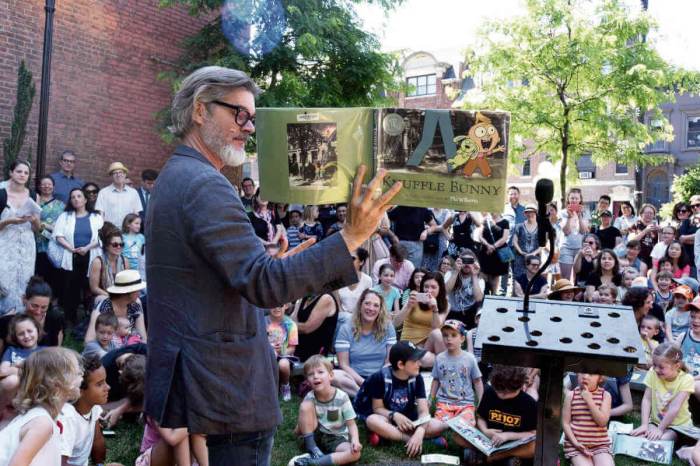BY ADRIENNE URBANSKI
New work effectively evokes classic fairy tale themes
In the current economic climate, simplicity in theater is more than just a stylistic choice. Often, it’s a necessity. Such is the case with First Light Theater Group’s current production of “Thirst: a spell for Christabel” — whose design elements were put together on a $35,000 budget. This adaptation of Samuel-Coleridge’s unfinished poem features a minimalist set that opts for imagination over elaborate props and special effects, a style that in the end that suits the simplistic and childlike piece.
The design team intentionally chose the smaller of Here’s two stages, located in the basement, which often plays host to puppet shows, and the tiny stage, bedecked with miniature trees, does indeed make the audience wonder upon initial seating if the play is to be performed by marionettes rather than live actors. The much smaller stage dimensions in the end better enabled the team to make the scenery seem fuller, even with a limited budget, allowing a simple bench and twin tree trunks to fill up most of the available space.
The simplicity and one dimensional-ness of the set ties in well to the work’s fable like feel, making it seem as though it were a page ripped from a children’s book and brought to life. The paper cutout silhouettes of barren trees bring to mind pictorials from the most frightening picture book scenes.
Beyond the scenery, the parallels between Thirst and your standard Grimm fairy tale are endless, beginning with an opening scene in which innocent Christabel (Elizabeth Gross who also serves as executive producer) digs up the mysterious Enid (Lori Funk) while scrounging for potentially poisonous berries in the barren forest. Laid out in a large tree trunk, Enid (known as Geraldine in Coleridge’s original work) awakes with a gasp, telling her of the men who kidnapped her and left her here. Her long fanciful blonde hair and sweeping white dress is reminiscent of Disney’s interpretation of Sleeping Beauty. Enid, however, turns out to be more evil stepmother than maiden in distress.
Naïve Christabel decides to bring Enid to her forest home, where she and her father have lived for the past two years in complete isolation. As Christabel’s mother is dead, she now must serve as her father’s caretaker, placating his mercurial temperament. “Thirst” refers to a terrible drought that has driven all other inhabitants from the area, and transformed most of the forest’s trees into dried out skeletons. Christabel and her father (Matthew Cowles) spend their time arguing over water rations — until Christabel supplicates him with homemade vodka. Christabel slips Enid past her drunken father and brings her to sleep beside her in her leaf-lined bed.
The play’s pivotal (and most frightening) scene commences when Enid asks to sleep in Christabel’s bed — gazing at her virginal body and commenting on the “unopened gifts” she holds. Here again, the work delves into a familiar fairy tale theme: evil arriving in the form of sexual corruption and awareness. Enid holds a mirror to Christabel’s face; coloring her lips with berries, and forcing her to view herself as a potential object of sexual desire (a role that Christabel recoils from with fear). Terror builds as Enid then pushes Christabel into bed — taking off her nightclothes and gazing at her breasts, which are momentarily visible to the audience. “I can’t move,” Christabel exclaims, as Enid leaps upon her and the set goes dark. In this bone-chilling scene, Enid has turned from the victim to the victimizer by robbing Christabel of her innocence the same way her captors supposedly did to her.
The suspense and fear evoked by this scene and much of the work can be credited to Funk’s skillful portrayal of Enid. She manages to imbue every line and expression with the implication of malicious intentions.
Upon waking, Christabel learns that Enid intends to steal not only her innocence, but her father as well. Enid flashes an evil smile as she reveals her intentions of becoming her father’s new wife — ridding the home of any remnants of her deceased mother. By this point, Enid has become too large and powerful for anyone to stop her.
Overall, the production makes full use of both a simple story line and a simple set. The richness of the actors’ performances, along with offstage supplementary sound, enable blue paper to convincingly become an apocalyptic flood and a simple wooden silhouette to become a sometimes ferocious dog.
The perhaps sole problem lies not in the hands of those behind its production, but rather in the source material the work is culled from. Coleridge himself was not able to finish the work, crediting its incompletion to the dramatic change in tone and themes that occurred as he wrote it. Coleridge explained his unfinished work in a preface stating, ““I have only my own indolence to blame.” While this is a piece rich with psychological and sexual metaphor — and open to multiple levels of interpretations —those who choose to take the story at face value may find the plot unsatisfying. All we are shown is the destruction of Christabel’s old life, rather than a glimpse of the new one that awaits once her ship touches the shore.



































